Thanks to those who read my face book plea a few days ago to pray for our staff, our families, and the conversation we were hosting on Friday with Steve Garber, author of Fabric of Faithfulness: Weaving Together Belief and Behavior (IVP; $16.00.) (See my hefty review of it here.) It means a lot that so many folks—including those who order books from us on line, even though we’ve never met—support our ministry, and call upon God to bless and sustain us. There is some pain and hardship on this end—where isn’t there?—and we are glad that friends care. We are blessed.
The Garber event hosted at Living Word Community Church was fabulous. Steve is a dear,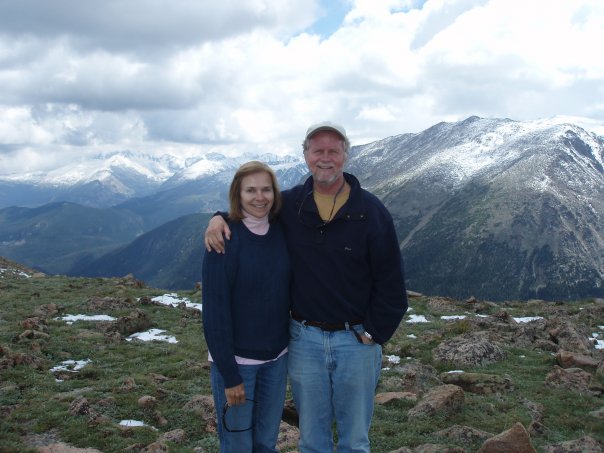 kind friend, and it was an honor to chat him up, as the Brits might say, in front of a crowd of more than 100. He is rich in his vocabulary, honest and profound, and although I tried to insert a bit of goofy upbeat energy, his intense and deeply meaningful conversational style carried the day. The mood in the Living Word coffee bar wasn’t somber, really (indeed, Steve talked a bit about his adolescent view of girls, joked about being a California boy who still isn’t fond of the cold Pennsylvania weather, and the significance of hope, informed by a Stanley Hauerwas article he uses with students sometimes.) But there was remarkable intensity in the room as people leaned forward to catch every word. We did struggle with important, weighty matters; he is a man of passionate energy, but gentle and soft-spoken. He told stories of having conversations about Africa with folks as different as rock star Bono, a republican leader in DC with whom he is friends, and Gary Haugen, who Steve had encouraged as he was starting the International Justice Mission (IJM) which pioneered the struggle against sexual trafficking; he has traveled to Africa with Jars of Clay promoting their Blood:Water Mission (he’s on their board) and has a son who is a veterinarian who studied disease control in India. Whew. The mood grew lighter, but no less insightful, when he talked about his own story—dropping out of college in the early 70s to live with other Christians in a Bay area commune and then going to L’Abri to meet Francis and Edith Schaeffer, learning to “not leave your brains at the box office” by attending cinema with the late Donald Drew, or moving to Pittsburgh to work for the CCO, mentoring young law or medical students in thinking about “the truest truths of the universe.” For a few years he helped organize our beloved Jubilee conference; there were some Jubilee-bound students there, in fact!
kind friend, and it was an honor to chat him up, as the Brits might say, in front of a crowd of more than 100. He is rich in his vocabulary, honest and profound, and although I tried to insert a bit of goofy upbeat energy, his intense and deeply meaningful conversational style carried the day. The mood in the Living Word coffee bar wasn’t somber, really (indeed, Steve talked a bit about his adolescent view of girls, joked about being a California boy who still isn’t fond of the cold Pennsylvania weather, and the significance of hope, informed by a Stanley Hauerwas article he uses with students sometimes.) But there was remarkable intensity in the room as people leaned forward to catch every word. We did struggle with important, weighty matters; he is a man of passionate energy, but gentle and soft-spoken. He told stories of having conversations about Africa with folks as different as rock star Bono, a republican leader in DC with whom he is friends, and Gary Haugen, who Steve had encouraged as he was starting the International Justice Mission (IJM) which pioneered the struggle against sexual trafficking; he has traveled to Africa with Jars of Clay promoting their Blood:Water Mission (he’s on their board) and has a son who is a veterinarian who studied disease control in India. Whew. The mood grew lighter, but no less insightful, when he talked about his own story—dropping out of college in the early 70s to live with other Christians in a Bay area commune and then going to L’Abri to meet Francis and Edith Schaeffer, learning to “not leave your brains at the box office” by attending cinema with the late Donald Drew, or moving to Pittsburgh to work for the CCO, mentoring young law or medical students in thinking about “the truest truths of the universe.” For a few years he helped organize our beloved Jubilee conference; there were some Jubilee-bound students there, in fact!
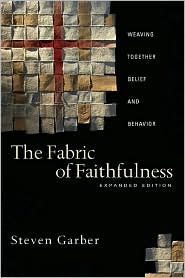
He didn’t set up a video screen, but he described the power of the song “Numb” written by The Edge and Bono, recorded on the U2 album Zooropa. (Don’t feel, don’t touch, don’t think, don’t connect…I feel numb!) There were some serious U2 fans in the crowd, sipping Seattle’s Finest roast, and this was a nice touch. We had some fun doing analysis of popular culture, and he shared a few key Bible insights. He told us about his longing for better answers about the meaning of our caring (or not caring, as the case may be) and what lead him to write this book about long-haul, responsible discipleship. I know a lot of folks enjoyed hearing a thoughtful author talk about his life, and how it shaped his book. Who knew it would go from the San Joaquin Valley to Helmhotlz Switzerland, from the Greek Stoics to contemporary Seinfeld. Yada, yada, yada, you know?
It was especially moving for us when he told about a moment he said he’d never forget, an evening when he was invited to listen to and talk about the gospel with, a private gathering of Tiananmen Square protest survivors, some who, in fact, where the actual ring-leaders of that historic uprising and massacre. He could not be glib–he does not believe in “cheap answers” he said—as he carefully listened to these young leaders who love China, and wondered if Christianity might provide them with a full-body vision of life, if it would be true enough, to answer the deepest questions for their heroic lives and their changing culture. He was speaking to the best and the brightest of the Asian world’s emerging culture, young leaders who saw their childhood friends die in their arms, perhaps the “Chinese Vaclav Havels” as the State Department China expert put it to him. What would you say?
And we smiled as he answered a good question (what are some of the best things anybody said to you, what conversations were the most memorable or formative?) He told how his father wrote a letter blessing him when he chose to drop out of college; as a serious Christian and scientist in the early 70s this must not have been easy for him to do, and Steve is even now grateful for that blessed encouragement. And he told how his future mother-in-law affirmed him when he and Meg announced they were to be wed. He may be a bit of a romantic, but this is more than romantic sweetness—he knows that it is the deepest truth of the gospel that we can be known (in our clay-footedness) and still be accepted. This grace shown to him by family is symbolic, for him, it seems, of the very grace of our merciful God, who knows us and loves us still. And who commissions us to know the world ever more deeply, and love it, as God does. Good stuff, this lovely episode from his courtship of Meg to a gospel centered life, to a passion for common grace for the common good in a world of war and sadness.
Well, the event was a good one, and we were glad to host an important writer, whose good words emerge from his good work, hosting conversations, networking artists and business folk, writing and speaking about the integration of vocation and the missio
n of God, the need to live fully for God in meaningful ways our secularized culture might understand. People stayed and asked good questions, hugged one another, browsed important books under the subdued lighting. It was a rich feast, an important and moving evening. Steve writes on occasion for Comment, so you can find some archived essays there if you’d like. And be sure to visit his own organization’s site, The Washington Institute on Faith, Vocation and Culture.
These questions about human responsibility to care was the thrust of his keynote addresses the next day as over 300 people gather at the LWCC Summit on Vocation: Your Work Matters to God. He suggested that a wise and faithful work world ministry is all about translating the truest things about the human condition and the nature of the world into concrete and incarnational practices that can help our neighbors and culture flourish. (It should come as no surprise, then, that he read Jeremiah 29, instructions for Daniel and the other exiles to “seek the peace of the city” where they find themselves.) We live in a needy world, and few have gotten this matter of work and economics and justice and jobs very well figured out. (Charles Dickens and Karl Marx lived in the same part of London in the same years, Steve noted, asking important questions about the meaning of the industrializing forces of the West, at the same time Pittsburghers were killing each other in the streets over labor uprisings and large factories and mills abusing their workers.) No, there are no easy answers or simple formulas for a wholistic and historically relevant kind of lifestyle or work life here within late-model capitalism. I’m not sure most of us who want to serve God day by day think about the big picture that much, so Garber was very helpful on this score. Yet, this isn’t abstraction (as he often said.) This is the full, down-to-Earth weight of our living in God’s world, with it’s needs and tragedies and joys and pleasures. He even told the story of his friend Hans Hess who has a top-shelf, organic-type, fair-trade, eco-friendly burger chain, Elevation Burger (yes, named after the U2 song.) The tag line is “Ingredients Matter.”
Comment magazine’s quarterly hard copy (they do a free weekly on line edition) had a great interview with Hans, by the way (“Jesus, Burgers & Taxi-Cabs”) in their last issue. We have a few that we sell for just $5.00. See it here and then let us know if you want one.
Again, despite these rather intense observations in Steve’s talks, and some passionately told stories, it was an upbeat day of thinking and learning and celebrating our call to leadership and service in our work. I got to introduce Steve, had the pleasure of touting his book, and I later led a workshop as did other folks who did seminars on thoughtful Christian engagement of the worlds of education, medicine, management, banking, and the like. There was a panel about women in the work-world, one workshop was on ethics, another on how to do evangelism in the workplace. Yet another popular one was on discerning one’s vocation and choosing a new career area. a lot of books. I believe the audio recordings of Steve’s two plenary talks will be available from LWCC and we will be glad to try to acquire them if you are seriously interested.
In a way, this event thrilled me as much as anything we have done for a while; to bring our friend Steve to a local church, to have that church so affirming and gracious in allowing he and I to have a public conversation, and then to help lead an entire event the next day, is a privilege. Equipping folks for thinking about Godly ways within their careers and callings has long been a passion of ours and I would love to have chances to talk further about being in the business world, say, or to help social workers or educators or blue collar employees. I am touched that some of my friends wanted to be a part of this kind of rare conversation and that LWCC pulled it off as they always do, with excellence and grace.
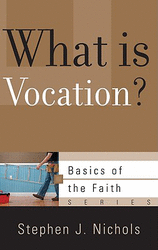 Much of all of this call to think Christianly about calling and career can be summarized, albeit a bit briefly, in a wonderful booklet we featured at the LWCC Summit, What Is Vocation? by Steven J. Nichols (P&R) $3.99. I loved promoting it at LWCC and hope you, too, might want to know about it.
Much of all of this call to think Christianly about calling and career can be summarized, albeit a bit briefly, in a wonderful booklet we featured at the LWCC Summit, What Is Vocation? by Steven J. Nichols (P&R) $3.99. I loved promoting it at LWCC and hope you, too, might want to know about it.
This little booklet is just fantastic to explore a Christian view of calling, vocation, work and career. It is simply a great read, a fine tool, and a useful way to invite people of faith to consider how their ordinary jobs may reflect God’s deepest care for the world. You may know of my fondness for The Call: Finding and Fulfilling The Central Purpose of Your Life by Os Guinness (Nelson; $17.99.) The short Steve Nichols booklet would appeal to any who like that, or it might be good for anyone who thought that the Guinness book to be a bit too literary or long. Nichols spends more time on simple teaching about work, serving God in your job, and learning to have an appropriate vision for and attitude about the old 9-to-5, so it is a bit more focused on employment than Guinness on the notion of calling. We really, really recommend it. (Plus, it is so important to, well, almost everybody, that you could easily share it with someone you know–who knows, maybe to start off a conversation at your own workplace. At this price, why not buy a batch?)
In my own workshop on work I noted four things that are described in a John Piper book called Don’t Waste Your Life (Crossway; $9.99) in the chapter called “Making Much of God in the 8 to 5.” Rev. Piper wonders–helpfully, as it ends up—how human work is different than, say, the work of a hummingbird or beaver. Beavers build dams and such, but somehow our work is different; we are made in God’s image and called to reflect His stewardly rule over the creation. We have freedom to work in certain ways. How is our work unique? 

Piper mentions four things; I will paraphrase them here.
1. We self-consciously dedicate our work to God. Like Genesis 1:26-28 suggests, and Romans 12:1 states, and Paul implores, our work is to be done to God’s glory; it is worship. I don’t think beavers intentionally do their building for God (unless they are Narnians, of course.) Like his hero Jonathan Edwards, Piper says we can do so, and we must.
2. We are called to live our lives in service to our neighbor. That is, Piper says, we must do our work as an act of love. With a bit of thinking, we can see the place nearly any job plays in that great web of social inter-dependence, and it seems to me that if you see the bigger picture of your supply chain or place in culture, you can see that what you do matters to somebody; your product or service, somehow, makes the world a better place. If not, maybe you should find another job. Anyway, Piper says we do our work in service, motivated by love.
3. While not everyone has the luxury of this, it is unique to our human condition to be able to be self-reflective about our skills and aptitudes, our gifts and abilities. We can wonder how we’re wired, and do work that brings some measure of satisfaction. We can be useful. Piper doesn’t g
o into this quite like, say, the great book by Max Lucado called The Cure for the Common Life or Randy Singer’s Made to Count but he does affirm that we should find a place of employment, to the extent that we are able, that is a good fit for who God has made us to be. We work using the gifts God has given us.4. The fourth is very intriguing to me, and is brief, but clear in the Piper chapter. Basically he notes that we are called to use our minds, determining the normative nature of any given job or task, and we then can use our God-given abilities to open up the possibilities of that sphere of creation in a way that is appropriate. That is, we do our job the right way, in harmony with the very structures of creation. We are called to wise reflection on normativity, and to submit to something like natural laws or creational ordinances. At the very least, this suggests a commitment to excellence, to mastering the habits, practices and skills of your given craft. We have to learn the ropes and do good work the right way.
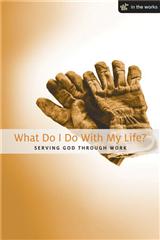 I promoted other good books that would serve well as an introduction to this topic such as the standard Your Work Matters to God by Douglas Sherman and William D Hendricks (NavPress; $16.99) and Mastering Monday: A Guide to Integrating Faith and Work by John Bennett (IVP; $18.00) or the handsome study guide for personal devotional use or small group What Do I Do With My Life: Serving God Through Work by Kenneth Baker (Faith Alive Resources; $9.99.)
I promoted other good books that would serve well as an introduction to this topic such as the standard Your Work Matters to God by Douglas Sherman and William D Hendricks (NavPress; $16.99) and Mastering Monday: A Guide to Integrating Faith and Work by John Bennett (IVP; $18.00) or the handsome study guide for personal devotional use or small group What Do I Do With My Life: Serving God Through Work by Kenneth Baker (Faith Alive Resources; $9.99.)
One of the foundational books on this topic, a serious and good collection I’ve mentioned here before is The Others Six Days Vocation, Work, and Ministry in the Bible (Eerdmans; $27.00) by R. Paul Stevens (who is a professor of marketplace theology at Regent College in Vancouver.) Read anything this good thinker writes! Leaders who are hoping to raise these concerns (pastors, preachers, campus ministers?) really should know this stuff and we recommend that as a key text. Professor Stevens has a new one that we commented on right before Christmas—what a wise and interesting work, Taking Your Soul To Work: Overcoming the Nine Deadly Sins of the Workplace (Eerdmans; $14.99.) This isn’t a cutesy title about “deadly sins of the effective worker,” meaning not dressing for success or something like that, but is a true study of the historic seven deadlies, plus two more, and ends up being a remarkable reflection on the sort of self-aware, gospel-based formation we need if we are going to do this “Christian perspective on the work world” stuff in long-term, sustainable ways.
As Eugene Peterson writes in his brilliant forward, noting that God works (creating the world) on the very first page of Scripture, and most of Jesus’ stories are set in fields and fishing boats, “Once we identify God in his workplace working, it isn’t long before we find ourselves in our workplaces working in the name of God….this is a major work for restoring dignity to the laity and infusing vigorous health into the Christian community.”
I told a number of folks about a book we had displayed, Shop Class as Soul Craft: An 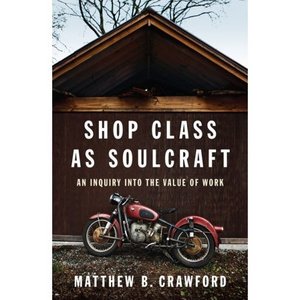 Inquiry into the Value of Work by Matthew Crawford (Penguin;$15.00) You may recall us raving about it when it first came out in hardback—it is about a thoughtful white collar scholar who is drained by the abstractions and confusing ethics of the think-tank world so he dropped out and started a stellar motorcycle repair shop. This is an eloquent, and much discussed book, about why we seem to devalue craft and mechanical skills; how will we survive the so-called “information age” if we fail to pass on the skills and dispositions needed to, well, fix stuff? How can work have greater meaning in an age when working with one’s hands is nearly despised. Great stuff, a bit literate for many blue collar guys who would tend to agree with it, and yet we commend it with hopes folks will work their way through it’s elegant, thoughtful prose and important, weighty arguments.
Inquiry into the Value of Work by Matthew Crawford (Penguin;$15.00) You may recall us raving about it when it first came out in hardback—it is about a thoughtful white collar scholar who is drained by the abstractions and confusing ethics of the think-tank world so he dropped out and started a stellar motorcycle repair shop. This is an eloquent, and much discussed book, about why we seem to devalue craft and mechanical skills; how will we survive the so-called “information age” if we fail to pass on the skills and dispositions needed to, well, fix stuff? How can work have greater meaning in an age when working with one’s hands is nearly despised. Great stuff, a bit literate for many blue collar guys who would tend to agree with it, and yet we commend it with hopes folks will work their way through it’s elegant, thoughtful prose and important, weighty arguments.
 And we announced that we were fond of the very creative, deeply faithful (but not written with religious sounding lingo) Sequencing: Deciphering Your Company’s DNA Decipher by Mike Meztger (Game Changer Books; $17.95.) It is ideal for anyone in business or the corporate world, or for anyone wonder how to help their company tell a better story, framing their work by the biggest questions and themes. You can get a flavor of his insight and writing style at the Clapham Institute’s DoggieHeadTilt blog.
And we announced that we were fond of the very creative, deeply faithful (but not written with religious sounding lingo) Sequencing: Deciphering Your Company’s DNA Decipher by Mike Meztger (Game Changer Books; $17.95.) It is ideal for anyone in business or the corporate world, or for anyone wonder how to help their company tell a better story, framing their work by the biggest questions and themes. You can get a flavor of his insight and writing style at the Clapham Institute’s DoggieHeadTilt blog.
And, I told them about those who reflect on all kinds of jobs and work-world matters at The High Calling blog. In fact, I quoted their recent piece “Your Artisanal Life” which was pretty nice. That’s a place you should check out daily!
In the workshop, we brainstormed a bit about songs and movies and jokes and saying that tend to impose a negative view of work upon us, and struggled to consider how to be faithful in corporations that do not treat us well. We wondered how we can be agents of God’s rule, even among supervisors, co-workers, clients and customers who may not have an idealistic vision of the exalted purpose of our work. It was important stuff for church folks to be talking about.
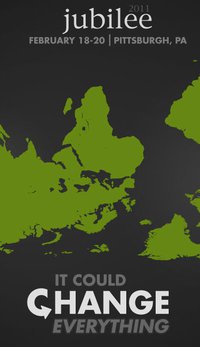 This great LWCC gathering—stretching and thoughtful and serious—feels now like a bit of a prelude to the bigger and splashier event with 2500 college students in Pittsburgh on Feb 28-20, the CCOs JUBILEE 2011 (not to mention the excellent Jubilee Professional day, held also at the Pittsburgh Convention Center all day on Friday, February 28th, co-sponsored by Pittsburgh Leadership Foundation, an event collaborating with the student event, but designed for adults in the workworld.)
This great LWCC gathering—stretching and thoughtful and serious—feels now like a bit of a prelude to the bigger and splashier event with 2500 college students in Pittsburgh on Feb 28-20, the CCOs JUBILEE 2011 (not to mention the excellent Jubilee Professional day, held also at the Pittsburgh Convention Center all day on Friday, February 28th, co-sponsored by Pittsburgh Leadership Foundation, an event collaborating with the student event, but designed for adults in the workworld.)
Check out that Jubilee conference link for archives of some of their old presentations—they have a cool feature called Jubilee TV which hosts video archives of some of the keynote speakers of the recent past.
If the local LWCC Summit event was more tender and important to me because it was among my best friends and neighbors here, the CCO Jubilee event is great because, well, it is about the best large conference in the whole world, and we’ve been attending since the mid-1970s, and it is run by a few of our very best young friends who are doing truly exceptional work. It is the largest thing we do and if you follow o
r pray for our bookstore ministry much, you already know of our yearly role there. There are Jubilee students for all kinds of college students, workshops on science and art, business and engineering, mathematics and theater, writing poetry and writing memoir, film and politics, creation care and soul care. It is energetic and fun, multi-ethnic and ecumenical. There are solid missions groups like IJM and Compassion International and World Harvest Mission there, and groups which network culture leaders around issues of worldview, cultural reformation and engaging the Christian mind—including web-based communities like catapult and the Canadian think-tank Cardus. That is going to be an amazing gig. If you know any college students anywhere in the mid-Atlantic, at least, it isn’t too late to get them to go. The younger generations of visionary evangelicals are energetic and thoughtful, and it seems to me that Garber and I worked out a lot of the vision for the very stuff we now talk about, the things about vocation and culture and caring about justice and nurturing the Christian mind in glory to the risen Christ, as we did at LWCC’s Summit this weekend, when we were their age, trying to make sense of a lackluster and disengaged evangelicalism of the post-Jesus movement years. Jubilee has been a signpost towards God’s Kingdom for Steve and Meg and Beth and me, as it has been for many…
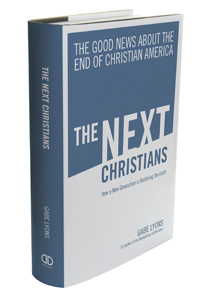 Gabe Lyon gets at this wonderfully when he writes about what he calls The Next Christians: How a New Generation is Restoring the Faith (Doubleday; $19.99) I was happy to be among the first booksellers to review this book last fall and we called it one of the books of the year in our “Best of 2010” list last week. I really like how we explains and holds up this wholistic vision of those who have little interest in culture wars or defending a Christian America, but only want to follow in the way of their savior, the true King Jesus, as they serve Him with grace in all areas of life. In many ways, this approach–based on the four-chapter story of the gospel of creation/fall/redemption/consumation is the very ethos of the Jubilee event!
Gabe Lyon gets at this wonderfully when he writes about what he calls The Next Christians: How a New Generation is Restoring the Faith (Doubleday; $19.99) I was happy to be among the first booksellers to review this book last fall and we called it one of the books of the year in our “Best of 2010” list last week. I really like how we explains and holds up this wholistic vision of those who have little interest in culture wars or defending a Christian America, but only want to follow in the way of their savior, the true King Jesus, as they serve Him with grace in all areas of life. In many ways, this approach–based on the four-chapter story of the gospel of creation/fall/redemption/consumation is the very ethos of the Jubilee event!
Gabe writes that these “next Christians” see themselves as called into vocations, not merely employed at occupations. They see themselves more as creators of culture than moralistic critics. They are less interested in pronouncing judgment about social evils, but are eager to help solve problems, in God’s ways. In all of this and more they want to be agents of God’s restoration. His Next Christians book and/or the new DVD is a perfect companion and follow-up, it seems to me, of the LWCC Summit and really resonates with the overall message offered by Garber at our time together last weekend. Lyon, in fact, is one of the many rising young evangelical leaders who esteems Garber and values his writings and work.


And (as things come full circle) Mr. Lyons is speaking in two weeks at Jubilee 2011. He’s one of several major main-stage speakers. Jubilee is a conference about nurturing young restorers. Garber will be there, too. What a month!


any book mentioned
please note that you saw the special and request the special discounts
order here
takes you to the secure Hearts & Minds order form page
inquire here
if you have questions or need more information
Hearts & Minds 2345 East Main Street Dallastown, PA 17313 717-246-3333
